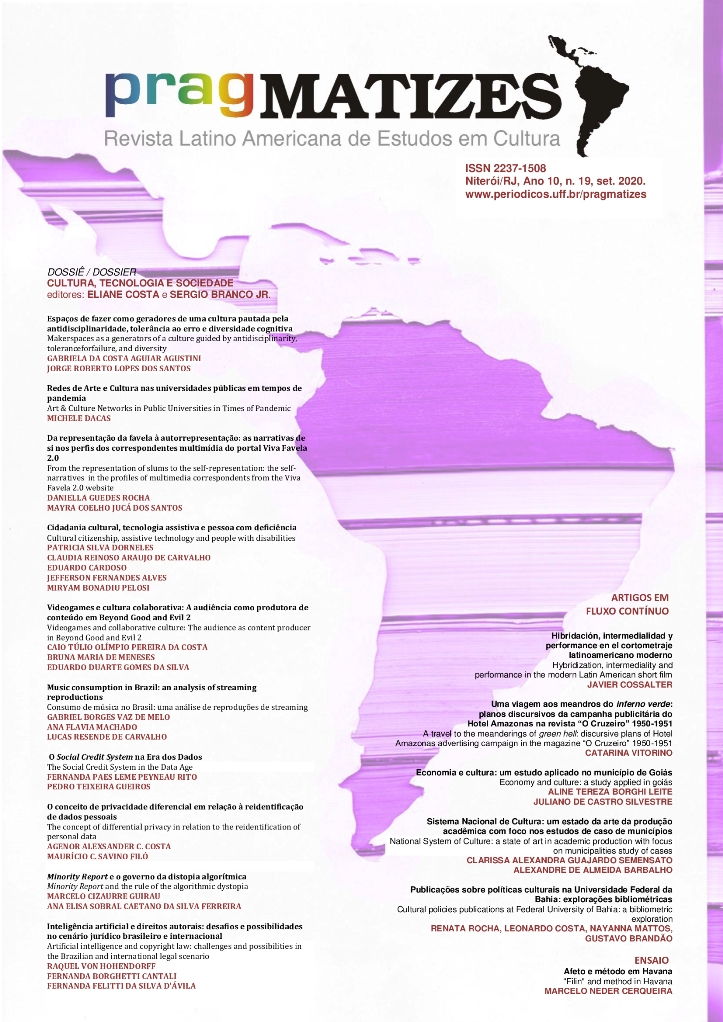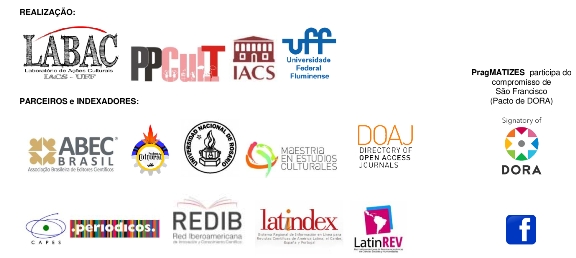Makerspaces as a generators of a culture guided by antidisciplinarity, toleranceforfailure, and diversity
DOI:
https://doi.org/10.22409/pragmatizes.v10i19.42522Keywords:
experimental, design, creativity, digital culture, makerspacesAbstract
This article proposes that three values assume an important role in stimulating the generation of new ideas and expanding access to knowledge, when guiding practices of technological learning spaces (makerspaces). They are: antidisciplinarity, tolerance for failure and diversity. The work is inserted in the context marked by the democratization of technologies that allow citizens outside major research centers and industry to materialize their ideas, express their worldview, their creativity and build knowledge from the interaction with artifacts. And it seeks to contribute to reflections on the digital society and the need to understand technological practices based on their cultural aspects.Downloads
References
ACKERMANN, E. K. Give me a place to stand and I will move the world! Life-long learning in the digital age. Journal for the Study of Education and Development. Volume 38, Issue 4, 2015. Disponível em: <https://www.tandfonline.com/doi/full/10.1080/02103702.2015.1076265>. Acesso em: 10 mar. 2020.
BLIKSTEIN, P. Maker Movement in Education: History and Prospects. In: M.J. de Vries (ed.). Handbook of Technology Education. Springer International, 2018.
BLIKSTEIN, P. O mito do mau aluno e porque o Brasil pode ser o líder mundial de uma revolução educacional. Sem data. Disponível em: <http://blikstein.com/paulo/documents/books/Blikstein-Brasil_pode_ser_lider_mundial_em_educacao.pdf>. Acesso em: 15 mar. 2020.
DAUGHERTY, M. K. The Prospect of an “A” in STEM Education. Journal of STEM Education, Volume 14, Issue 2, abr.-jun. 2013. Disponível em: <https://www.jstem.org/jstem/index.php/JSTEM/article/view/1744/1520>. Acesso em: 5 mar. 2020.
DOUGHERTY, D. “The Maker Movement”. MIT Press Journals, 2012. Disponível em: < https://www.mitpressjournals.org/doi/pdf/10.1162/INOV_a_00135>. Acesso em: 10 mar. 2020.
DOUGHERTY, D. Free to Make: How the Maker Movement Is Changing Our Schools, Our Jobs, and Our Minds. North Atlantic Books, 2016.
DUNNE, A.; RABY, F. Speculative Everything: Design, Fiction, and Social Dreaming. Cambridge, Massachusetts: The MIT Press, 2013.
EDMONDSON, A. Strategies for Learning from Failure. Harvard Business Review. Edição Abril de 2011. Disponível em: < https://hbr.org/2011/04/strategies-for-learning-from-failure>. Acessado em: 10 mar. 2020.
EGBERT, M. Creating Makers: How to Start a Learning Revolution at Your Library. Libraries Unlimited, 2016.
GARBER, E.; HOCHTRITT, L.; SHARMA, M. Introduction. In: Makers, Crafters, Educators: Working for Cultural Change. Oxford: Routledge, 2019.
GOODE, L. Why the ‘Queen of Shitty Robots’ Renounced Her Crown. Wired magazine, 12 out. 2019. Disponível em: <https://www.wired.com/story/simone-giertz-build-what-you-want/>. Acesso em: 10 mar. 2020.
GORE, N. Craft and innovation: Serious play and the direct experience of the real. Journal of Architectural Education, Volume 58, Issue 1, pp. 39-44, 2004.
HALVERSON, E.; SHERIDAN, K. M. 2014. The Maker Movement in Education. Harvard Educational Review, Vol. 84, No. 4, inverno de 2014. Disponível em: <https://www.semanticscholar.org/paper/The-Maker-Movement-in-Education-Halverson-Sheridan/66147755ddbaaa159bd5c59bcfad72f33e5c427b>. Acesso em: 7
INGOLD, T. Making: Anthropology, Archaeology, Art and Architecture. Onxford: Routledge, 2013.
ITO, J. Design and Science: Can design advance science, and can science advance design? Journal Of Desing and Science, 12 jan. 2016. Disponível em: <https://jods.mitpress.mit.edu/pub/designandscience>. Acesso em: 20 mar. 2020.
ITO, J.; HOWE, J. Disrupção e inovação: como sobreviver ao futuro incerto. Rio de Janeiro: Alta Books, 2018.
KELLY, K. What scientific concept would improve everybody’s cognitive toolkit? 2011. Disponível em: <https://www.edge.org/response-detail/10422>. Acesso em: 5 mar. 2020.
LAND, M. H. Full STEAM Ahead: The Benefits of Integrating the Arts Into STEM. Procedia Computer Science, Volume 20, pp. 547-552, 2013.
LEITE, P. P. Sobre a distinção entre história e evolução em Tim Ingold. Social Evolution & History, Vol. 1, No. 1, pp. 5-24, jul. 2002. Disponível em: <https://globalherit.hypotheses.org/6719>. Acesso em: 9 mar. 2020.
MARCHAND, T. H. J. Learning, Education and Apprenticeship. Journal of the Royal Anthropological Institute, 18 (1). pp. 209-210, 2012.
MITCHELL, R.; NICHOLAS, S. Knowledge Creation in Groups: The Value of Cognitive Diversity, Transactive Memory and Open-mindedness Norms. Electronic Journal of Knowledge Management, Volume 4, Issue 1, pp. 67-74, 2006. Disponível em: < https://www.researchgate.net/publication/220826009_Knowledge_Creation_in_Groups_The_Value_of_Cognitive_Diversity_Transactive_Memory_and_Openmindedness_Norms>. Acesso em: 5 mar. 2020.
OXMAN, N. Age of Entanglement. 2016. Disponível em: <https://jods.mitpress.mit.edu/pub/AgeOfEntanglement>. Acesso em: 3 mar. 2020.
SANDERS, M. Becoming a Learner: Realizing the Opportunity of Education. Institute for Communication & Leadership, 2012.
SILVA, R. B.; MERKLE, L. E. Perspectivas educacionais FabLearn: conceitos e práticas maker no Brasil. In: Fablearn Conference, 2016. Disponível em: <https://www.researchgate.net/publication/308098069_Perspectivas_educacionais_FabLearn_conceitos_e_praticas_maker_no_Brasil>. Acesso em: 5 mar. 2020.
SNOWDEN, E. Eterna vigilância: como montei e desvendei o maior sistema de espionagem do mundo. São Paulo: Planeta, 2019.
STAPPERS, P.; GIACCARDI, E. Research through Design. The Encyclopedia of Human-Computer Interaction, 2nd Ed., Sem data. Disponível em: <https://www.interaction-design.org/literature/book/the-encyclopedia-of-human-computer-interaction-2nd-ed/research-through-design>. Acesso em: 7 mar. 2020.
Published
How to Cite
Issue
Section
License
By forwarding an original to PragMATIZES, the authors agree that the copyright related to it is transferred to the Publishing. Articles and other writings are made available in PDF format from their publication, and they can be downloaded to institutional repositories and personal pages, provided that with their proper bibliographic indication.



